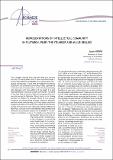Representations of intellectual community in Plutarch, Pliny the Younger and Aulus Gellius
Abstract
This chapter argues that the late first and second century CE was a period which saw important experiments with different possibilities for representing intellectual community. I look first at Plutarch’s Sympotic Questions: his sympotic community is tied together by a shared style of conversation, which involves entering into dialogue with the authors of the past; it is also represented as a strongly Greek community, not least in the fact that so many of the conversations Plutarch records are set at festivals. Pliny’s Letters are closely parallel to Plutarch’s project: there is not enough evidence to demonstrate mutual influence between the two works conclusively, but Pliny does conjure an image of an elite community that shares the scale and variety of Plutarch’s work, although with the difference that Pliny is much more interested in the portrayal of the book as a physical object, for example in his portrayal of recitation culture. For Gellius too Plutarch’s Sympotic Questions is an important point of comparison, in fact Plutarch is one of the main inspirations for his work, but he too, even more so than Pliny, gives great prominence to the act of reading; the elite community he presents also has far few named figures, and that different reflects his interest in solitary engagement with the writings of the past as an essential complement to learned conversation.
Citation
König , J P 2019 , ' Representations of intellectual community in Plutarch, Pliny the Younger and Aulus Gellius ' , Archimède. Archéologie et histoire ancienne , vol. Special issue 1 , pp. 54-67 . < http://archimede.unistra.fr/revue-archimede/archimede-hors-serie-n-1-2018/archimede-hs-n1-2018-la-republique-greco-romaine-des-lettres-construction-des-reseaux-savants-et-circulation-des-savoirs-dans-lempire-romain/ >
Publication
Archimède. Archéologie et histoire ancienne
Status
Peer reviewed
ISSN
2418-3547Type
Journal article
Description
Part of special issue: La République « gréco-romaine » des lettres: construction des réseaux savants et circulation des savoirs dans l’Empire romain. Editors: Anthony Andurand and Corinne BonnetCollections
Items in the St Andrews Research Repository are protected by copyright, with all rights reserved, unless otherwise indicated.

